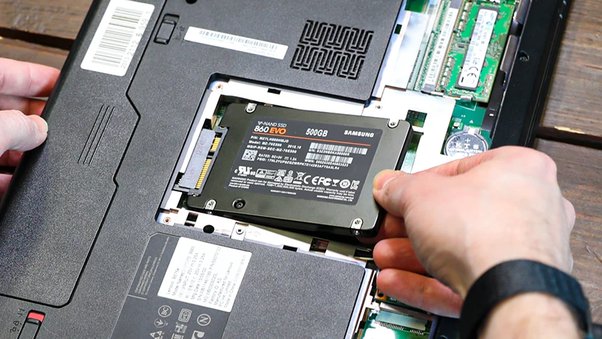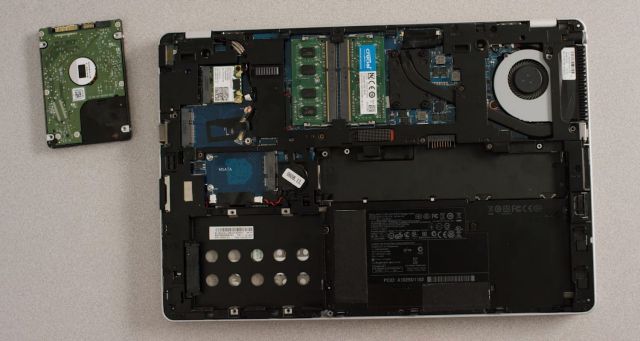Understanding Ssd: Perks And Power in Modern Laptops
Introduction
The emergence of solid-state drives (SSDs) has revolutionized the computing world, specifically how we use our laptops. SSDs, with their exceptional speed and performance, have become a crucial component of modern laptops. This guide will walk you through what an SSD is, why it's essential for modern laptops, the difference between SSD and HDD, how SSDs impact laptop performance, and how to choose the right SSD for your laptop.
What is an SSD in a Laptop?
Digging into the world of laptops, you'll often come across the term 'Solid State Drive' or SSD. It is a quintessential component playing a pivotal role in shaping your laptop's performance. Wondering what exactly it does? Let's delve in and unravel its functionalities:
- SSD is a data storage medium: In any laptop, the SSD acts as the primary device for storing data. Be it your essential files, your operating system, or the apps you frequently use, SSD takes care of it all.
- Utilizes Flash Memory: Unlike the traditional Hard Disk Drives (HDDs), SSDs run on integrated circuit assemblies, primarily using flash memory. This technically advanced approach eliminates moving parts that were intricately associated with HDDs, steering clear of potential physical damage.
- Enhanced durability: The lack of moving parts doesn't just lower the risk of physical mishaps but also significantly boosts the lifespan of SSDs.
- Quick data access: SSDs provide a fast lane for your laptop to access and process data. The results? You experience lightning-fast boot times, quick application launches, and swift file transfer.
Essentially, an SSD is the turbo engine of your laptop, driving speed, reliability, and efficiency. Without an SSD, a modern laptop would find it challenging to meet the high-performance demands of today's fast-paced digital world.
Why is SSD Crucial for Modern Laptops?
In the fast-paced world of technology, the SSD has emerged as a fundamental component for enhanced laptop performance. Here's why SSDs are pivotal for laptops in this modern age:
- Speed: SSDs are renowned for their speedy data access and retrieval capabilities. They outstrip traditional Hard Disk Drives (HDDs) in this regard. This means quicker booting times, files load faster, and applications launch speedily.
- Durability: SSDs are devoid of moving components, making them less susceptible to physical damage. Their durability attributes extend the laptop's lifespan.
- Efficiency: In terms of power consumption, SSDs have the upper hand over HDDs. They consume less power,, which correlates to improved battery life. Moreover, they generate less heat, helping your laptop to operate more efficiently.

- High Storage Capacity: Modern SSDs can store vast amounts of data, accommodating sizeable software applications and documents without sacrificing performance.
- Reliability: As SSDs have no moving parts like traditional HDDs, they are less prone to mechanical failure, making them a reliable choice for data storage.
To substantiate the significance of SSDs, let us consider some statistics and facts:
- According to a 2019 report by Backblaze, SSDs have lower annualized failure rates compared to traditional hard drives. For instance, the failure rate of an SSD after four years of use is 1.5% while for HDDs, after the same period, it’s 4.7%.
- In a speed comparison test, an SSD-equipped PC can boot up in less than a minute, sometimes in just seconds. In contrast, a hard drive requires time to rev up to operating specs, and it will continue to be slower than an SSD during regular use.
Given all these attributes, it's clear to see how the SSD has become an indispensable asset to modern laptop functionality.
SSD vs HDD: What's the Difference and Which is Better for your Laptop?
When choosing a storage solution for your laptop, SSD and HDD are the two primary contenders. Although they serve the same essential function--secure storage for your data--each comes with unique features and advantages.
HDD Explained
Hard Disk Drives (HDDs) have been a trusted choice for many years. They use magnetic storage techniques, relying on rotating disks and a mechanical arm for data storage and retrieval.
HDD Advantages:
- Cost-Effective: HDDs continue to be significantly more affordable when comparing cost per gigabyte.
- High Capacity: HDDs offer larger capacities, making them ideal if you need ample storage.
HDD Disadvantages:
- Slower Speed: HDDs can’t match the speed of SSDs, impacting boot times and file access.
- Fragility: HDD's mechanical components make them vulnerable to physical shocks.
SSD Explained
Solid State Drives (SSDs) are a relatively new solution brought by advancements in flash memory technology. With no moving parts, they provide data storage and retrieval purely through electronic means.
SSD Advantages:
- Lightning Quick: SSDs offer rapid boot times, swift file transfers, and overall faster performance.
- Robust and Reliable: Resistant to shocks and drops due to the absence of mechanical parts.
SSD Disadvantages:
- More Expensive: Though costs are reducing, SSDs are still pricier.
- Limited Storage: SSDs usually provide less storage space than HDDs of a similar price.
Deciding between SSD and HDD boils down to your unique requirements:
- If your primary concern is speed, responsiveness, and reliability, SSD is the correct choice.

- If the price is a deciding factor and you need loads of storage, HDD could be an ideal fit.
Though initial costs may be high, an SSD's superior speed and performance might bring value, making it a worthy investment in the long run. However, remember that an HDD still offers reliable performance and massive storage at a much affordable cost. Choose wisely to get the most from your laptop.
How Does SSD Impact the Performance of Laptops?
Solid-State Drives (SSDs) bring striking enhancements to laptop performance across several dimensions. The swift read/write speeds, sturdy construction, and low power requirements of SSDs culminate in a noticeably superior laptop experience. Here's how:
- Faster Boot Times and Application Launches: SSDs offer speedier write/read speeds compared to traditional Hard Disk Drives (HDDs), eliminating inconvenient wait times. This translates into rapid start-ups and quick launches for software applications.
- Boosts System Performance: SSDs revamp the operational efficacy of your system as they are equipped for rapid file-searching, swift backups, and effective multitasking.
- Reduction in Lag: SSDs, with their absence of moving parts unlike HDDs, reduce system lag almost completely, making computing processes significantly faster and smoother.
- Extended Battery Life: The lower power consumption of SSDs helps in preserving your laptop's battery life, providing you with longer spans of uninterrupted use – this is particularly beneficial for users who utilize their laptops on the go.
- Silent and Cool Operation: SSDs operate in an almost silent manner as there are no moving parts to create noise. In addition, the lack of heat generation ensures your laptop won't be prone to overheating, even while handling a heavy workload.
In essence, the adoption of SSDs greatly revs up laptop performance whether in day-to-day activities or heavy-duty tasks. SSDs redefine system efficiency, operational speed, and longevity of laptop use, thereby providing users a vastly enhanced computing experience.
What to Consider When Choosing an SSD for Your Laptop?
Integrating an SSD into your laptop can certainly boost its performance. However, selecting the right SSD is extremely important to ensure it suits your needs and maximizes the potential of your laptop. The selection process involves assessing various aspects such as:
1. Storage Capacity - Assess your storage needs based on your usage. For everyday tasks and storing documents, a 250GB or 500GB SSD may suffice. However, if your activities include heavy gaming, video editing, or handling large datasets, you may want to consider 1TB or 2TB options.
2. Read and Write Speeds - Check the Sequential write and read speeds of the SSD. Higher speeds translate to better performance. An SSD typically has a read/write speed of over 500MB/s.
3. Durability - Gauge the lifespan and resilience of the SSD. Most SSDs are robust and last several years, but some models are more enduring than others.
4. Price - SSDs vary in price, mainly depending on their capacity and speed. A larger and faster SSD will generally be more expensive.
All of these will culminate in a decision that will positively impact your laptop's performance, your workflow, and your overall user-experience.
Conclusion
In conclusion, SSDs have become a necessary component for modern laptops. With their superior speed, performance, durability, and energy-saving features, they significantly enhance the overall performance and efficiency of laptops. When choosing one, consider your data storage and speed requirements, budget, and long-term needs.
Related FAQs about what is ssd in laptop
Can I replace my HDD with an SSD in my laptop?
Absolutely, replacing an HDD with an SSD is a common upgrade to boost the speed and efficiency of a laptop. You typically need to ensure the SSD is compatible with your laptop's make and model.
Do SSDs improve the overall performance of my laptop?
Yes, SSDs can greatly improve the performance of your laptop. They enable faster boot times, quick application launches, swift file transfer, increased reliability, and extended battery life.
Are SSDs more durable than HDDs?
Yes, the absence of moving parts in SSDs make them less susceptible to physical damage compared to HDDs, enhancing their durability and lifespan.


